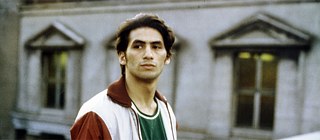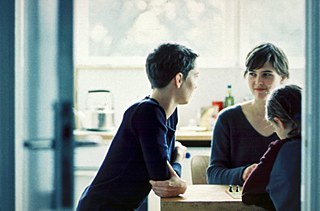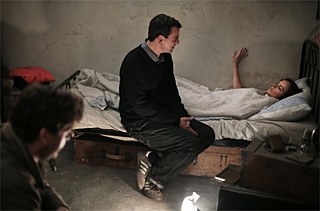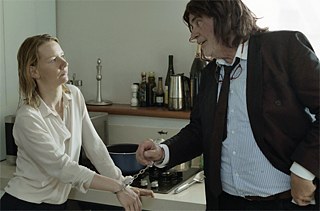The Berlin School
Cinema full of Surprises and Dangers

In the middle of the nineties the filmmakers of the “Berliner Schule” (The Berlin School) created radically new images of German society. Their films still have so much to say about their country.
When you look back at the German cinema landscape of the nineties, you mostly come across banal comedies - relationship crises between men and women, taking place in the yuppie milieus of the big German cities. German cinema seemed to be shying away from the new situation after the fall of the Wall. The year 1989, reunification and all the upheavals that came with it were rarely dealt with on the silver screen. The great social, political and cultural changes occurred more in the East of Germany, the former GDR, in the rest of the country they were comparatively less tangible and obvious. In retrospect, the films of the so-called Berliner Schule can be seen as documents of a society in transition viewed from a West German perspective. The first films by Christian Petzold (born in 1960), Thomas Arslan and Angela Schanelec (both born in 1962), who all studied at the German Film and Television Academy in Berlin were a sensation. Their more restrained approach to characters, places and moods alone made them stand out from the staidly conventional German films of the nineties.
Internal uncertainty

The Kreuzberg films, set in the eponymous district in Berlin (Geschwister /Siblings, 1997; Dealer, 1999, Der schöne Tag / A Fine Day, 2001) by Thomas Arslan have now taken on an almost documentary character. In perceived real-time his youthful heroes and heroines of mostly Turkish origin hang out in the district of Kreuzberg that at that time had hardly been gentrified. They drift through the day, aimlessly, laid back and enjoy the feeling of belonging to the Kiez (the “hood”), which is soon no longer to be theirs. Today the area around Görlitzer Park would be no place for young drifters.
Die innere Sicherheit (The State I Am In, 2000) by Christian Petzold in turn is a reflection on the state of the political left in Germany. His symbolisation depicts a small family, a former terrorist couple who, with their daughter, drive through the German provinces in a white Volvo. You get the impression that the three of them are completely cut off from the outside world. “The German Left died two deaths, the first in the “deutscher Herbst” (the German autumn of terror in 1977), the second after the collapse of the GDR. It began to barricade itself in its own infrastructure, in its day-care centres, organic food stores and converted loft apartments,” says Christian Petzold.
The fact that they do not tell classic stories fits in with the attitude of these films, because they cannot be put into the context of a large historical narrative. Instead, life moves back onto the screen again, various moods of life in quiet settings captured on parking lots, on the streets of Berlin or in the kitchens of flat shares. It is these precise studies of the prevailing conditions with their bright, clear images that open the cinema audience's eyes to German reality.
Criticism created the Berliner Schule
These films do, in fact, adopt a radically subjective perspective towards their subject matter, in order to once again achieve a general study of a prevailing social condition. This new approach has been critically acclaimed and endowed with the Berliner Schule label. It is not a case here of a new movement like the Nouvelle Vague in France, a grouping of directors who all embrace a particular cinematic vision. No, it is more a case of the Berliner Schule enabling the critics to feel more at ease with German cinema - partly because they are directors who have dealt with German and international film history. On the screen, they engage in a passionate dialogue with their predecessors, because they know that each image is prompted by an exemplary image. The Berliner Schule has triggered a new discourse on the social importance of cinema in Germany –similar to the times of the New German Cinema in the sixties and seventies.“Cinema has to be dangerous”
Younger directors are reviving this discourse: Maren Ade, Valeska Grisebach, Ulrich Köhler, Benjamin Heisenberg and Christoph Hochhäusler. Even beyond the realm of cinema they are sounding out the medium they work with and all its possibilities. They organise film screenings followed by discussions, monothematic panel discussions, and in 1998 the film magazine, Revolver, came into being. In the first issue there was a pamphlet entitled “Cinema has to be dangerous” written by co-editor Christoph Hochhäusler, in which he embraced the philosophy of this second generation of filmmakers of the Berliner Schule – “Let's be realistic, let’s examine reality. Let's explore the pain threshold through the medium of film. Let us try to make films that are not obvious, but personal, not imitative, but observant.”
German Cinemy is visible again
In the meantime the term Berliner Schule is barely used. The years in which the directors needed this label to help them along the new paths they were taking are long gone. Their cinema, however, is still full of surprises and dangers, still working on reality no matter what the genre. In his western, Gold (2013), Thomas Arslan recalls the time when Germany was a nation of emigrants, in his wayward thriller, Phoenix (2014), Christian Petzold takes up the story of a Jewish woman who returns to Germany after the Second World War and desperately seeks the old Germany she knew and her old love.